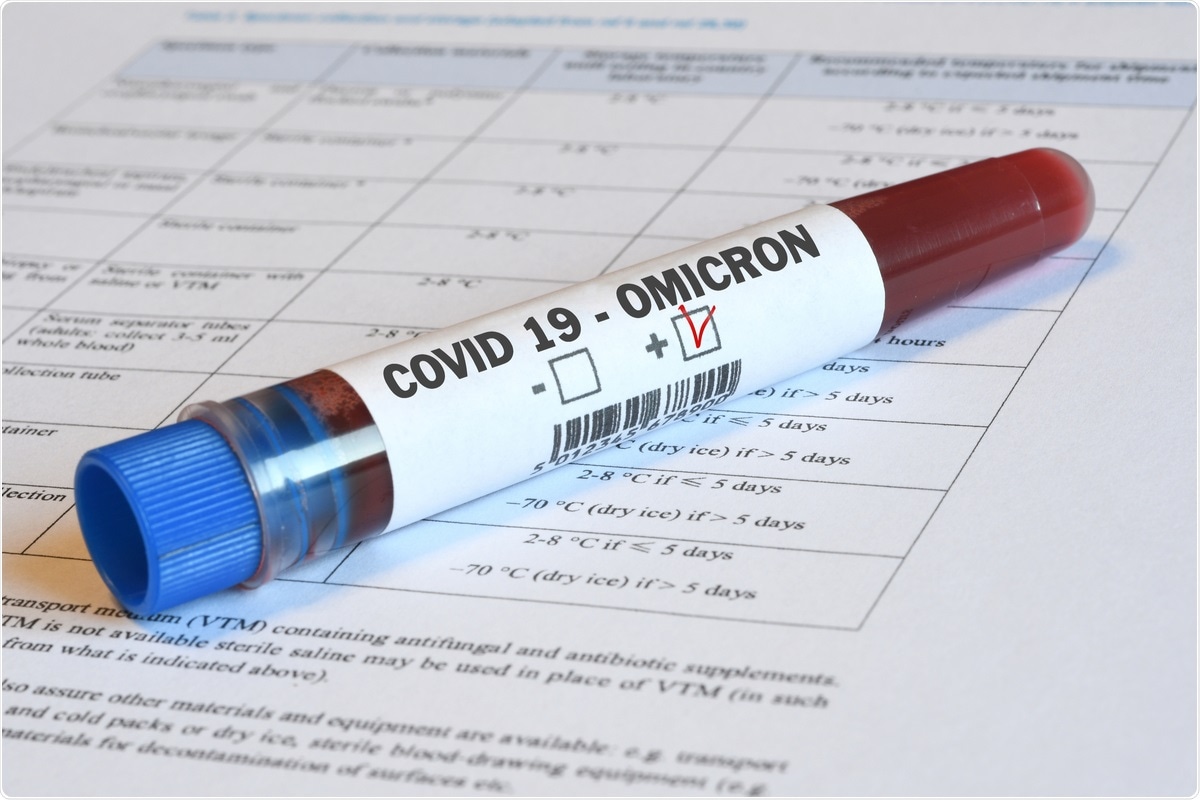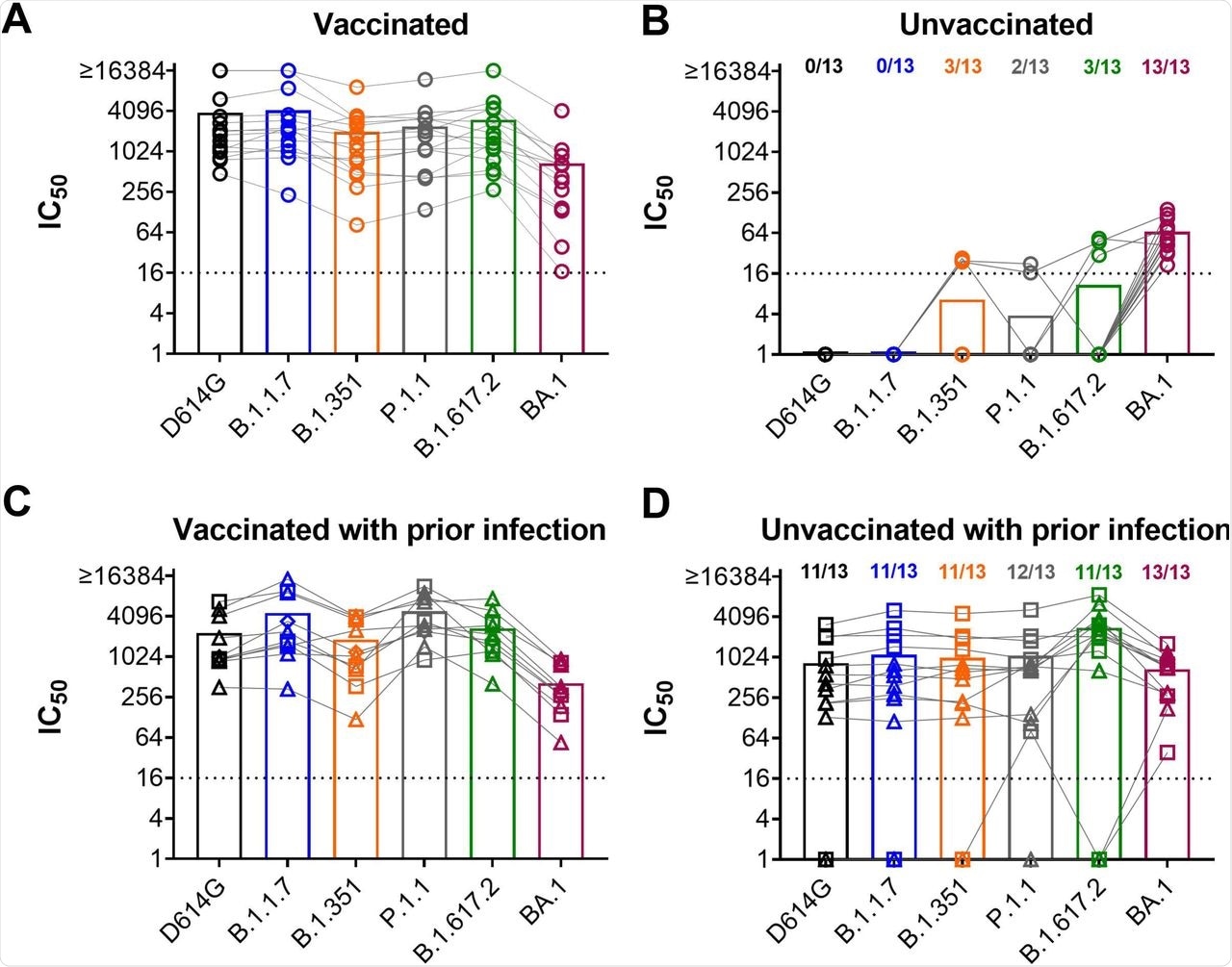Greater neutralizing titers observed in vaccinated individuals with breakthrough Omicron infection
Despite the rapid rate of development and dissemination of severe acute respiratory syndrome coronavirus 2 (SARS-CoV-2) vaccines, the emergence of multiple variants of concern (VOC) has threatened the efficacy of these vaccines. To date, the five SARS-CoV-2 VOCs include the Alpha, Beta, Gamma, Delta, and more recently, the Omicron variants.
The administration of convalescent plasma to coronavirus disease 2019 (COVID-19) patients has been one of the primary methods to treat patients with severe forms of the disease. However, little is known about the neutralizing power and duration of these natural antibodies from infections with different variants, especially the newly reported Omicron variant (BA.1).

Study: Neutralization profile of Omicron variant convalescent individuals. Image Credit: Dan74 / Shutterstock.com
About the study
In a recent study published on the preprint server medRxiv*, researchers assess the neutralizing power of plasma samples collected from Omicron (BA.1) convalescent individuals who were either vaccinated or unvaccinated. The neutralization power of these samples was tested against several SARS-CoV-2 strains including the Alpha, Beta, Gamma, Delta, and Omicron variants.
In the current study, the researchers collected plasma samples from individuals between five and 35 days after they tested positive for the Omicron (BA.1) variant by reverse transcriptase-polymerase chain reaction (RT-PCR). Their antibody titers were compared against four categories of individuals, which included 15 vaccinated individuals without a prior history of infection, 13 unvaccinated individuals without a prior history of infection, 10 vaccinated with a history of COVID-19 by a non-Omicron variant, and 13 unvaccinated individuals with prior SARS-CoV-2 infection by a non-Omicron variant.
Study findings
Both vaccinated individuals without a history of COVID-19 and unvaccinated individuals with a history of COVID-19 had high neutralizing antibody titers against all SARS-CoV-2 variants. Interestingly, neutralizing antibody titers against the Omicron variant were less in vaccinated individuals with a history of COVID-19 as compared to unvaccinated individuals with a history of COVID-19.
Unvaccinated individuals without a history of COVID-19 primarily contained neutralizing antibodies against the Omicron variant; however, some individuals had neutralizing antibodies against other SARS-CoV-2 variants. Notably, these neutralizing antibody levels in naïve and unvaccinated individuals were significantly lower than those in the other three patient groups.

Neutralization capacity of plasma samples from BA.1 (Omicron) convalescent patients.
Implications
The current study confirms the efficiency of vaccination; however, it also demonstrates that a breakthrough Omicron infection can provide better immunity as compared to infection with any other variant. Furthermore, unvaccinated individuals who are infected with an Omicron strain appear to be at significant risk of future infections if they remain unvaccinated.
*Important notice
medRxiv publishes preliminary scientific reports that are not peer-reviewed and, therefore, should not be regarded as conclusive, guide clinical practice/health-related behavior, or treated as established information.
- Roessler, A., Knabl, L., von Laer, D., & Kimpel, J. (2022) Neutralization profile of Omicron variant convalescent individuals. medRxiv. doi:10.1101/2022.02.01.22270263. https://www.medrxiv.org/content/10.1101/2022.02.01.22270263v1.full-text.
Posted in: Medical Research News | Disease/Infection News
Tags: Antibodies, Antibody, Convalescent Plasma, Coronavirus, Coronavirus Disease COVID-19, covid-19, Efficacy, immunity, Omicron, Polymerase, Polymerase Chain Reaction, Respiratory, Reverse Transcriptase, SARS, SARS-CoV-2, Severe Acute Respiratory, Severe Acute Respiratory Syndrome, Syndrome

Written by
Sreetama Dutt
Sreetama Dutt has completed her B.Tech. in Biotechnology from SRM University in Chennai, India and holds an M.Sc. in Medical Microbiology from the University of Manchester, UK. Initially decided upon building her career in laboratory-based research, medical writing and communications happened to catch her when she least expected it. Of course, nothing is a coincidence.
Source: Read Full Article
